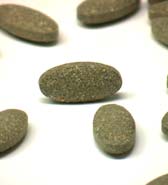
I
strongly recommend this product to anyone who has or who is experiencing
hair loss regardless of gender.”
~L.D. Stephens
Learn to Save Your Hair
When You Know the Words that Go With Hair Loss, You Can Make the Right Choices to Save Your Hair
Alopecia is the medical term for all forms of baldness. Androgenetic alopecia is the term for common pattern baldness, which affects over 50% of men over 40, and possibly as many women. We’d like you to understand the scientific knowledge about these terms. That way, you can understand hair loss, and you can find the hair loss remedy that’s right for you.
As we’ve mentioned before, each hair follicle on your head goes through a growth cycle. In the anagen phase, your hair is growing. In the telogen phase, your hair stops growing. In the case of hair loss, the telogen phase lasts longer, and there are more hairs in the telogen phase than in the anagen phase.
If you suffer from androgenetic alopecia, the anagen phase gradually becomes shorter, leading to more hair in the telogen phase. If you do not use a hair loss product, you may experience increased shedding of your hair. In the advanced cases of androgenetic alopecia, you may experience bald patches, or a receding hairline.
Aside from the visual effect, and the risk of exposing your scalp to more ultraviolet radiation, there’s no inherent danger in androgenetic alopecia. However, your appearance is important to your career and your relationships. In some situations, you can stop or reverse androgenetic alopecia by using various hair growth products and hair loss remedies.
We’re going to tell you more about the medical terms involved in hair loss, because when you’re informed you can make better decisions. While there hasn’t been much research on herbal hair loss products, you can learn more about natural hair loss treatments.
The most important things to know about androgenetic alopecia
Two important medical terms describing hair loss are anagen effluvium and telogen effluvium. While most hair loss is primarily genetic, “effluvium” refers to hair loss caused by trauma or stress to the hair follicles.
Anagen effluvium is the condition when normal, active follicles suddenly stop producing new hair, i.e., the anagen phase abruptly stops. Telogen effluvium is the sudden loss of hair during the telogen, or resting phase.
This sudden loss of hair or an abrupt halt to hair growth usually comes from chemotherapy. In extremely rare cases, intense stress has been said to cause anagen or telogen effluvium. Other causes include exposure to toxic chemicals, malnutrition, and certain illnesses. In particular, iron deficiency has been linked to anagen effluvium.
Treatments for androgenetic alopecia
Only two chemical hair loss treatments have been approved by the FDA.
Minoxidil is thought to increase the length of the anagen phase, and it may also increase the flow of blood to the follicles. It seems to work better for women, and in any case once you start using it you have to continue or your hair will quickly revert to its previous state of baldness.
Finasteride can cut down the progress of androgenetic alopecia, and in some situations it may stimulate regrowth of your hair. This hair loss product only works for men. As with Minoxidil, once you start taking it you need to keep using it.
Natural products for alopecia and herbal hair loss remedies
There is little data on the effects of natural herbal treatments for hair loss. However, an understanding of the deeper causes of androgenetic alopecia will help show you how herbal hair treatments might help prevent the loss of your hair.
Aside from genetics, the most common cause of hair loss is exposure to toxic chemicals. Therefore, any herbal remedy that can help protect you from toxins and clean them out of your system could also protect your hair follicles.
Many diseases also contribute to alopecia. It follows that if you use herbal products that support your immune system, you have a chance to resist hair loss.
Finally, it is known that malnutrition can lead to alopecia. In addition, the deficiency of certain minerals might contribute to baldness. A regular, potent herbal supplement contains many micronutrients that can help nourish and strengthen your hair follicles, and herbal hair loss remedies could prevent alopecia.
Stay informed about the causes of hair loss. If you would like to learn more about herbal hair loss products, visit http://www.samsonssecret.com.
The information in this article is not meant to diagnose, treat, or cure any condition. Please consult with your physician before using dietary supplements or hair loss products.
To learn more about herbal hair loss products, contact Samsons Secret Offices.
originally published 6-01-2005